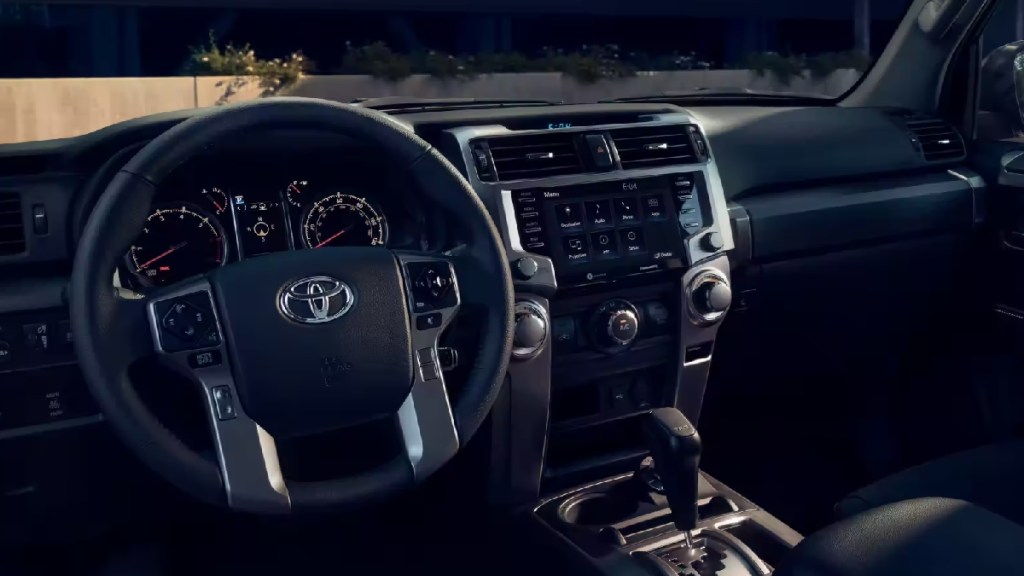
3 Most Common Reasons for Toyota 4Runner Check Engine Light
The Toyota 4Runner midsize SUV has a reputation for being very reliable. It typically runs strong for many miles — whether for off-road excursions or daily commutes. However, like any vehicle, problems can arise, resulting in a check engine light illuminating. View the three most common reasons for a Toyota 4Runner check engine light. We also evaluate its reliability.
What causes the check engine light to come on in a Toyota 4Runner?

The check engine light in the Toyota 4Runner acts as a warning indicator. Sensors and systems monitor various parts of the midsize SUV — and when they detect a problem, the check engine light on the dashboard illuminates. Nalley Toyota and RepairPal cover the most frequent causes, which are based on owner complaints.
Here are the three most common reasons for a check engine light in the Toyota 4Runner:
- Emissions system issue
- Malfunctioning sensor: Mass air flow or oxygen
- Problem with the catalytic converter
It’s important to note that many 4Runner models are not affected by these problems. Overall, it’s a reliable SUV. However, these were the most frequent check engine light issues cited by owners, so let’s cover them in greater detail.
Most common reason for a Toyota 4Runner check engine light is an emissions system issue

The most common reason for a check engine light in the Toyota 4Runner is an emissions system issue. Symptoms of an emissions system problem include engine failure, shifting complications, jerking, and slow acceleration.
One of these emissions system issues is a vacuum leak. With repeated use over time, the midsize SUV’s vacuum hoses can dry out and crack, which is worsened by extreme heat and cold. The vacuum hose is a critical component for minimizing harmful vehicle emissions — for it routes the engine fumes through the engine when the gasoline evaporates. A sign of a vacuum leak is a high RPM when idling — or the RPM unexpectedly surges.
Malfunctioning sensor: Mass air flow or oxygen
The second most frequent cause of a Toyota 4Runner check engine light is a malfunctioning sensor, either from the mass airflow or oxygen sensor. When exposed to dirty or particle-rich air, the mass air flow sensor can sometimes fail. Problems caused by a faulty mass air flow sensor include engine misfire, damage to the engine, weaker performance, and lower fuel economy.
For an oxygen sensor, malfunctioning often occurs as a result of prolonged exposure to a hot exhaust. The oxygen sensor is a crucial part of the midsize SUV, for it provides vital information about the air-fuel mixture to the electronic control unit (ECU). And a malfunctioning oxygen sensor can supply either too much or little gasoline to the midsize SUV. Too little gasoline can cause engine failure, while symptoms of too much are smoke and a foul odor.
Problem with catalytic converter
The other most common reason for a Toyota 4Runner check engine light is a problem with the catalytic converter. Types of catalytic converter problems include contamination, overheating, and clogging. The main function of a catalytic converter is to convert polluting emissions into harmless gases — so a faulty one can result in more air pollution. Other symptoms include engine failure and sluggish performance.
Is the Toyota 4Runner a reliable midsize SUV — and is it expensive to repair?
The Toyota 4Runner is a reliable midsize SUV. RepairPal gives it an “above average” reliability rating of 4.0 out of five. In a field of 26 midsize SUVs, the 4Runner ranks ninth for reliability.
Also, the average annual cost to repair the 4Runner is $514. This is lower than the $573 average yearly cost for midsize SUVs and $652 for all types of vehicles.



